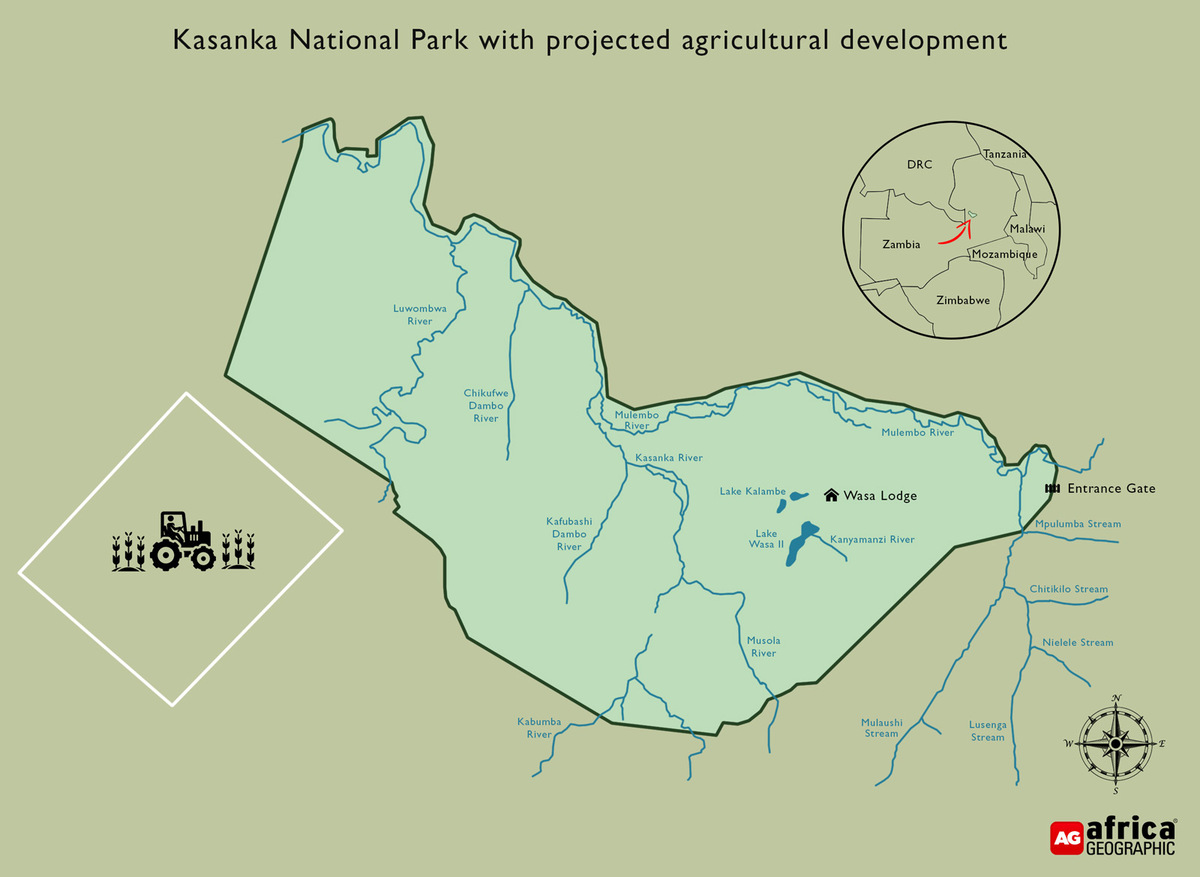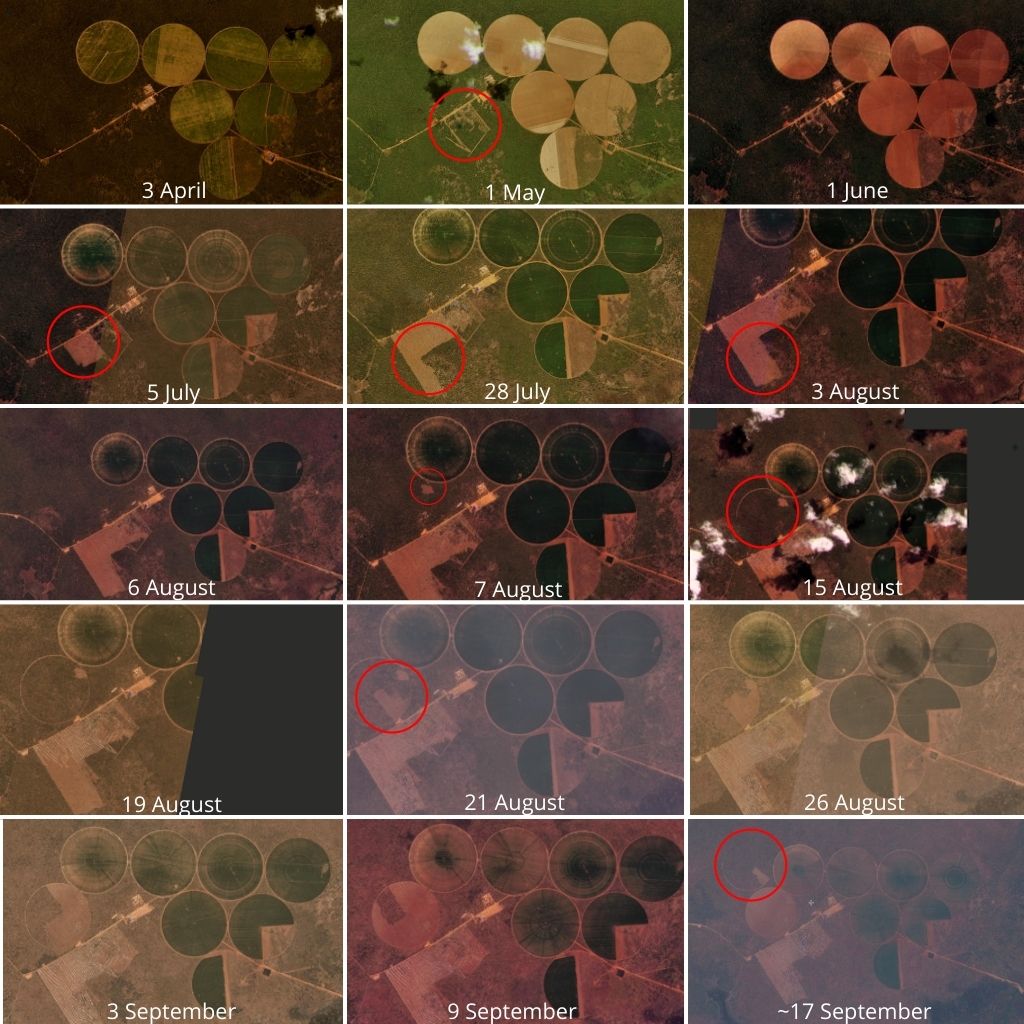UPDATE: The Zambian High Court has ruled in favour of the communities and wildlife of Kasanka National Park, granting an injunction that restrains Lake Agro Industries and Gulf Adventures Limited from carrying out any more damaging activities in Kafinda Game Management Area. The ruling, delivered on 25th January 2022, will halt the deforestation of protected land and water abstraction within the area.
Up until this ruling was made, Lake Agro Industries, a Tanzanian company, continued to clear forest within the Kafinda Game Management Area (GMA) in the Kasanka National Park buffer zone. The Kasanka National Park is home to the world’s most numerous mammal migration – that of the straw-coloured fruit bats. (For background to this story, see here). Since our previous report, satellite imagery shows the company had, between August and September, illegally cleared more than 80 hectares of additional, protected forest within Kafinda. This is despite the Department of National Parks and Wildlife (DNPW) ordering them to stop all clearance in July 2021.

For more than two years, Kasanka Trust has been working closely with DNPW to fight this illegal development that threatens the internationally important biodiversity of Kasanka National Park. Other government ministries, departments and regulatory authorities contacted regarding this matter include the Ministry of Agriculture, the Ministry of Lands, Zambia Environmental Management Agency (ZEMA), Zambia Water Resources Management Authority (WARMA), Central Province Administration, Office of the President, Disaster Management and Mitigation Unit (DMMU), Office of the Public Protector Zambia, Chitambo Local Council, and the District Commissioner’s Office Chitambo.
Everything culminated in a petition to the President of Zambia, signed by more than 6000 people who want to stop this illegal activity. Yet Lake Agro Industries continues to ignore all orders to desist clearing the land, demonstrating disrespect for Zambia – her laws, her natural heritage and her people.
Lake Agro Industries claims to have title to the land, but the DNPW director (who has to authorise land allocation in the GMA) knows nothing about it. It is a rather confusing and distressing situation, not least because the government departments don’t seem to be talking to each other.
Lake Agro Industries submitted an EIA report to ZEMA in May, and as far as we know, ZEMA has not made any formal response or comment on the issue.
Separately, there have been four Stop Orders issued over the past two years. The most recent was in July 2021 when DNPW issued a Stop Order saying that Lake Agro Industries could continue to farm the seven pivot circles already cleared, with the proviso that they obtain the relevant water abstraction permit and clear no other land.
Lake Agro Industries maintains that they have not cleared any new land at all in 2021 and is respecting the latest Stop Order. On the 4th of August, Kasanka Trust was present at a meeting in which the manager told DNPW that no more land would be cleared until receipt of the formal decision from ZEMA.
This latest satellite evidence (see below) is significant. It shows that Lake Agro Industries is not truthful and strengthens the argument that it can’t be trusted. They began clearing the eighth pivot circle three days after that meeting with DNPW.
Their practice destroys protected habitats and seriously threatens important ecosystems, critical to the survival of both wildlife and local communities.
Timeline of events
July 2019: A subsidiary of the Tanzanian Lake Group illegally occupies land in the Kafinda GMA. It clears 160 hectares of pristine forest to set up two centre pivot circles for agricultural irrigation.
August 2019: Department of Forestry issues the first Stop Order instructing that no further clearance takes place.
October 2019: Lake Agro Industries continues clearing, creating a total of seven pivot circles, representing over 560 hectares of illegal deforestation.
November 2019: Permanent Secretary of the Ministry of Tourism and Arts (P. S. MOTA) issues a second Stop Order after field verification.
March 2020: The Director of DNPW issues a third Stop Order. This time, DNPW follows through and closes the farm. Urgent meetings are held between Lake Agro Industries and DNPW, and permission is granted for the farm to re-open to harvest crops only – but no further activity is permitted.
April 2020 to November 2020: Lake Agro Industries continues to farm the seven established pivot circles.
December 2020: P. S. MOTA and the French Ambassador to Zambia fly over the farm to confirm the development. P.S. MOTA demands that Lake Agro Industries submit documentation and follow legal procedures.
April 2021: The Director of DNPW visits the farm and instructs the developer to stop all activity.
May 2021: Lake Agro Industries submits an Environmental and Social Impact Statement (ESIS) to the Zambian Environmental Management Agency (ZEMA) requesting permission for a commercial agriculture development over a 7,000-hectare footprint (3,000 hectares of arable land plus associated infrastructure).
Lake Agro Industries begins clearing a new land area for cattle farming (apparent from analysis of satellite imagery).
June 2021: Kasanka Trust submits a 21-page statement summary outlining how the ESIS fails to meet even the most basic principles of EIA and must be rejected. The statement is supported by over 40 organisations from Zambia and beyond, representing the tourism industry, community groups, conservation NGOs, filmmakers and researchers. At least 500 different representations are also made to ZEMA by organisations and members of the public objecting to the scheme.
July 2021: DNPW issues a fourth Stop Order, allowing Lake Agro Industries to farm the cleared 560 hectares (but advising that the relevant water abstraction permits can only be granted by WARMA), and prohibiting any further clearance.
Kasanka Trust works with WWF Zambia to deliver a letter to the former president, urging him to save Kasanka.
4th August 2021: DNPW visits the farm and reminds the Lake Agro Industries manager that no further clearance is permitted.
7th August 2021: Lake Agro Industries begins clearing a new area of land for arable crops and continues clearing the cattle farming area (apparent from analysis of aerial imagery).
28th August 2021: Kasanka Trust prepares a petition for delivery to the new president, having obtained more than 6000 signatures from all over the world.
9th September 2021: Aerial imagery shows that since May 2021, over 100 hectares of additional land have been cleared for cattle, plus almost 80 hectares to install an eighth pivot circle since August 2021.
25th January 2022: The Zambian High Court grants an injunction restraining Lake Agro Industries and Gulf Adventures Limited from carrying out any more damaging activities in Kafinda Game Management Area.

About the author
This story was prepared by the Kasanka Trust, a wildlife charity based in Zambia, the UK and the Netherlands. It manages the Kasanka National Park in Zambia’s Central Province. The Trust’s main objectives are to secure the future of biodiversity of Kasanka National Park and to stimulate, as well as sustain the local economy through its mission of “Tourism for Conservation”. The Kasanka Trust relies entirely on donor funding and income received through tourism to run and manage its projects.
To comment on this story: Login (or sign up) to our app here - it's a troll-free safe place 🙂.![]()






